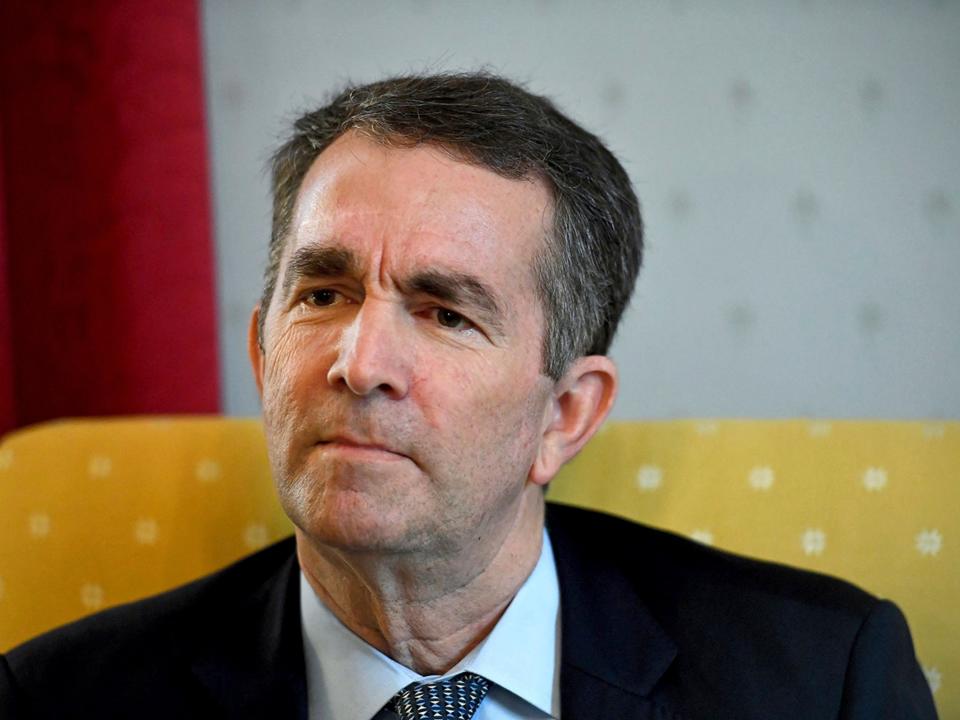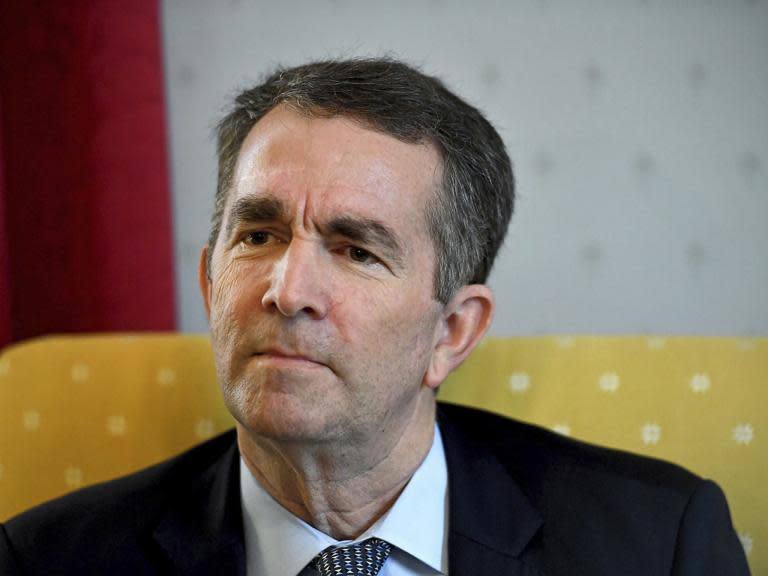Ralph Northam: Virginians split on calls for governor to resign after blackface scandal, poll finds
Virginians are deadlocked over whether Governor Ralph Northam should step down after the emergence of a racist photo from the Democrat’s 1984 medical school yearbook, according to a Washington Post-Schar School poll.
Following the release of the image last week, which shows a man in blackface next to another in a Ku Klux Klan outfit, there have been demands for Mr Northam to resign.
But the poll, conducted from Wednesday-Friday, finds residents split over Mr Northam's fate, with 47 per cent wanting him to step down and 47 per cent saying he should stay on.
Mr Northam counts higher support among black residents – who say he should remain in office by a margin of 58 per cent to 37 per cent – than among whites, who are more evenly divided.
On the scandals buffeting the state's other top elected officials, the poll finds that about a third of Virginians think Attorney General Mark Herring should resign after he admitted wearing blackface at a party when he was an undergraduate at the University of Virginia. A 60 per cent majority say he should stay in office.
Most remain undecided about a woman's allegation that Lieutenant Governor Justin Fairfax sexually assaulted her in 2004, with 65 per cent saying they didn't know enough to judge Mr Fairfax's denial of the accusation.
Respondents were not asked about a second sexual assault accusation against Mr Fairfax by a Maryland woman on Friday, after the poll began.
The Post-Schar poll also finds that 11 per cent of residents have either worn blackface or personally know someone who has.
The survey offers a snapshot of the competing and sometimes conflicting emotions that grip Virginia one week after the state government was plunged into chaos by the publication of Mr Northam's yearbook photo on a conservative website.
Since then the capital has been in a near-constant state of crisis. On Thursday the scandals spread across party lines, as state Senate Majority Leader Thomas Norment, acknowledged he was among several editors of the 1968 Virginia Military Institute yearbook, which contained racist photos and slurs. Mr Norment said he was not responsible for the material.
Nearly three-quarters of Virginians report reading or hearing “a lot” about Mr Northam's yearbook photo. Among those who paid attention to the story, 55 per cent say the photo offended them.
But befitting a state with a complicated 400-year history of racial divisions, Virginians show deep ambivalence over what should result from the revelations.
Their conflicted views point to a substantial gap between the worlds of politics and social media – which have showcased a near-unanimous consensus among elected officials, advocacy groups and the occasional celebrity that Mr Northam has lost the public trust and must resign – and public opinion.
“The data here are so at odds with what party leaders have led us to believe – that the governor has no support to govern effectively anymore,” Schar School Dean Mark Rozell said.
Still, the governor's image has taken a hit. Mr Northam's 43 per cent approval rating is the lowest any Virginia governor has held in a Washington Post poll since 1997, and contrasts with more positive polling results for Northam last year.
The fallout from a news conference he held on 2 Feburary appears to have been particularly damaging.
At that event, Mr Northam backtracked on his admission just a day earlier to appearing in the photo. The governor said he had realised he was not one of the costumed figures and speculated that the photo had been placed on the page without his knowledge.
He simultaneously admitted that he had put shoe polish on his face to impersonate Michael Jackson during a 1984 dance contest. At one surreal moment during the live national press conference, Mr Northam appeared ready to demonstrate the moonwalk, but was dissuaded by his wife, Pam.
More than 7 in 10 Virginians say Mr Northam's assertion that he did not appear in the photo was not believable after his earlier statement.
“Initially I could have forgiven him, and I think he could have gotten past it. It was something that was 35 years ago,” said David Hughes, a Newport News sheriff's deputy. “What really bothered me was the change in story.”
Hughes, who is 54 and African-American, said that his career in law enforcement has taught him to look sceptically at reversals of the kind Mr Northam made. “Typically, if a person changes their story, it's not because they remember more,” he said. “It's because they're being deceptive.”
Mr Hughes voted for Northam in both the primary and general elections. Now he thinks the governor should resign.
“I'm torn, because I do think he's a good governor,” he said. “But I think once he changed his story, as far as I'm concerned, I don't see moral leadership there.”
Despite their incredulity at his explanation of the yearbook page, a slim 53 per cent majority of Virginians say they accept Mr Northam's apology for the photo. Some 50 per cent of residents say he could be an effective governor for the remaining three years of his term, while 46 per cent say he could not.
Louise Butler, 76, is African-American and grew up in Richmond, where she still lives. In her youth the city was segregated, and Ms Butler can still vividly recall an argument she had as a teenager with a white woman over where she was allowed to sit on a bus.
Ms Butler, who attended Mr Northam's inauguration, said she was shocked and disappointed by Mr Northam's yearbook photo. She said the Klansman costume, in particular, brought back memories of the terrorism and discrimination experienced by African-Americans in the South before and during the civil rights movement.
But she said that whatever views Mr Northam held in 1984, she was confident that he was now committed to advancing racial equity. “He's been a good governor, and he's been good, as far as I know, to black people,” Ms Butler said.
While Democratic leaders at the state and national level have called for Mr Northam's resignation, the governor still commands support among many of his party's voters, the poll shows. Some 57 per cent of Democrats say he should remain in office.
Independents split more evenly, with 47 per cent saying Mr Northam should resign and 43 per cent saying he should not. Republicans say he should step down by a margin of 56 per cent to 42 per cent.
Within the Democratic party, Mr Northam has greater support from African-Americans than whites. A 57 per cent majority of black residents who identify or lean Democratic say he should continue to lead the state, compared to 49 per cent of whites who identify or lean Democratic. Some 47 per cent of African-Americans overall say Mr Northam has accomplished a great deal or good amount as governor, compared with 30 per cent of whites.
Kevin Shank, a 57-year-old white Republican who runs a woodworking business in Augusta County, said he was not personally offended by the photograph in Northam's yearbook. He said he had never worn or seen anyone wear blackface, but that based on the revelations of the past week he surmised it must have been a common occurrence.
“I think they was going to parties and it was something they did,” Mr Shank said. “Seems like there was a lot of it going on.”
The Post-Schar poll finds that Virginians, by a margin of 53 per cent to 38 per cent, think their leaders have not adequately addressed the state's history of racial discrimination, which began with the arrival of the first enslaved Africans on Virginia soil in 1619. Nearly 8 in 10 black Virginians say state leaders have not done enough.
The Post-Schar School poll was conducted by telephone from 6-8 February 2019 among a random sample of 706 adults in the Commonwealth of Virginia, including 62 per cent reached on cell phones and 38 per cent on landlines. Overall results have a margin of sampling error of plus or minus 4.5 percentage points; the error margin is plus or minus 10 points among the sample of 132 African-American residents and 5.5 points among the sample of 459 white residents.
Washington Post


